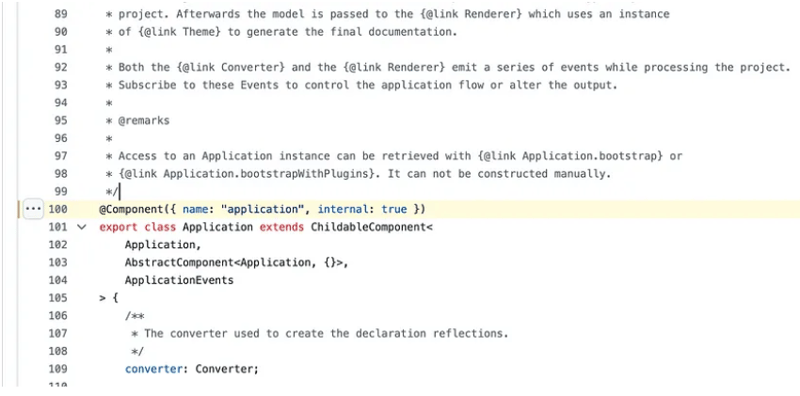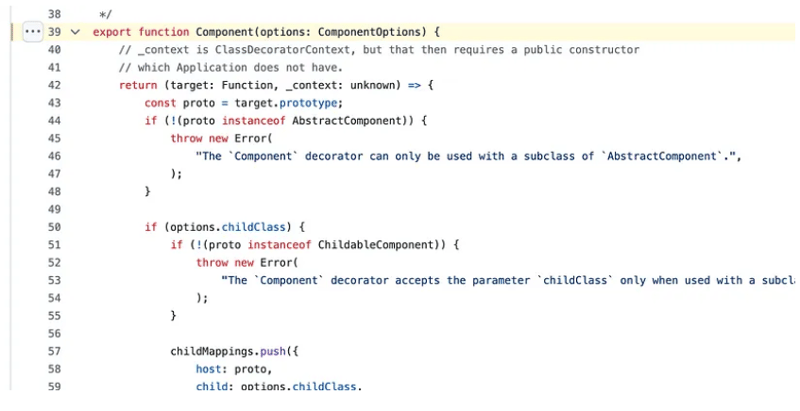TypeDoc のコンポーネント デコレーター
この記事では、TypeDoc のコンポーネント デコレータを分析します。

一歩下がって、まず TypeScript のデコレーターとは何かを理解しましょう。
TypeScript のデコレーター
A Decorator は、クラス宣言、メソッド、アクセサー、プロパティ、またはパラメーターに添付できる特別な種類の宣言です。デコレーターは @expression 形式を使用します。expression は、装飾された宣言に関する情報を使用して実行時に呼び出される関数として評価される必要があります。 - ソース。
たとえば、デコレータ @sealed を指定すると、sealed 関数を次のように記述できます:
function sealed(target) {
// do something with 'target' ...
}
TypeScript のクラス デコレータ
クラス デコレーターの使用方法について、TypeScript ドキュメントからシンプルでわかりやすい例を選択してみましょう。
@sealed
class BugReport {
type = "report";
title: string;
constructor(t: string) {
this.title = t;
}
}
ここで @sealed は、クラス宣言のすぐ上に適用されるクラス デコレータです。この @sealed は実行時に適用されるデコレーターです。
クラス BugReport への変更を防ぎたい場合は、次のようにシールされた関数を定義できます:
function sealed(constructor: Function) {
Object.seal(constructor);
Object.seal(constructor.prototype);
}
@sealed が実行されると、コンストラクターとそのプロトタイプの両方がシールされるため、実行時に BugReport.prototype にアクセスしたり、BugReport 自体のプロパティを定義したりすることによって、このクラスに機能が追加または削除されるのを防ぎます。ソース
この知識により、TypeDoc コード ベースの @Component デコレーターを理解する準備が整いました。
@TypeDoc のコンポーネント デコレータ
@Component デコレータは lib/utils/components.ts
からインポートされます
これは、実行時に実行されるアロー関数を返すデコレータ ファクトリです。デコレータ ファクトリの詳細については、TS ドキュメントを参照してください。
export function Component(options: ComponentOptions) {
// _context is ClassDecoratorContext, but that then requires a public constructor
// which Application does not have.
return (target: Function, _context: unknown) => {
const proto = target.prototype;
if (!(proto instanceof AbstractComponent)) {
throw new Error(
"The `Component` decorator can only be used with a subclass of `AbstractComponent`.",
);
}
if (options.childClass) {
if (!(proto instanceof ChildableComponent)) {
throw new Error(
"The `Component` decorator accepts the parameter `childClass` only when used with a subclass of `ChildableComponent`.",
);
}
childMappings.push({
host: proto,
child: options.childClass,
});
}
const name = options.name;
if (name) {
proto.componentName = name;
}
// If not marked internal, and if we are a subclass of another component T's declared
// childClass, then register ourselves as a _defaultComponents of T.
const internal = !!options.internal;
if (name && !internal) {
for (const childMapping of childMappings) {
if (!(proto instanceof childMapping.child)) {
continue;
}
const host = childMapping.host;
host["_defaultComponents"] = host["_defaultComponents"] || {};
host["_defaultComponents"][name] = target as any;
break;
}
}
};
}
このコンポーネント デコレータでは多くのことが行われています。すべてを理解しようとするのではなく、推定できる簡単なものを取り上げてみましょう。
- プロトインスタンス
このチェックは、インスタンスがサポートされていない場合にエラーをスローするために使用されます。
2.プロト.コンポーネント名
proto.componentName は、デコレーターに渡された名前に基づいて更新されます。この場合、名前は「アプリケーション」となります。
3.子マッピング
// If not marked internal, and if we are a subclass of
// another component T's declared
// childClass, then register ourselves as a _defaultComponents of T.
const internal = !!options.internal;
if (name && !internal) {
for (const childMapping of childMappings) {
if (!(proto instanceof childMapping.child)) {
continue;
}
const host = childMapping.host;
host["_defaultComponents"] = host["_defaultComponents"] || {};
host["_defaultComponents"][name] = target as any;
break;
}
}
childMapping.host にいくつかの更新が行われました
私たちについて:
Think Throo では、オープンソース プロジェクトで使用される高度なコードベース アーキテクチャの概念を教えることを使命としています。
Next.js/React の高度なアーキテクチャ概念を実践してコーディング スキルを 10 倍にし、ベスト プラクティスを学び、本番レベルのプロジェクトを構築します。
私たちはオープンソースです — https://github.com/thinkthroo/thinkthroo (スターを付けてください!)
また、ウェブ開発およびテクニカル ライティング サービスも提供しています。詳細については、[email protected] までお問い合わせください。
参考文献:
https://github.com/TypeStrong/typedoc/blob/master/src/lib/application.ts#L100
https://www.typescriptlang.org/docs/handbook/decorators.html
https://github.com/TypeStrong/typedoc/blob/master/src/lib/utils/component.ts#L39
https://www.typescriptlang.org/docs/handbook/decorators.html#decorator-factories
-
 C ++メンバー関数ポインターを正しく渡す方法c でメンバー関数ポインターを渡す方法。特定の署名を持つ関数ポインターが必要です。メンバー関数を渡すには、オブジェクトポインター(この)とメンバー関数ポインターの両方を提供する必要があります。これは、次のようにmenubutton :: setButton()を変更することで実現でき...プログラミング 2025-07-16に投稿されました
C ++メンバー関数ポインターを正しく渡す方法c でメンバー関数ポインターを渡す方法。特定の署名を持つ関数ポインターが必要です。メンバー関数を渡すには、オブジェクトポインター(この)とメンバー関数ポインターの両方を提供する必要があります。これは、次のようにmenubutton :: setButton()を変更することで実現でき...プログラミング 2025-07-16に投稿されました -
 コンテナ内のdiv用のスムーズな左右のCSSアニメーションを作成する方法は?左右の動きのための一般的なCSSアニメーション この記事では、一般的なCSSアニメーションを作成して、その容器の端に到達する左右に移動することを探ります。このアニメーションは、その未知の長さに関係なく、絶対的なポジショニングで任意のdivに適用できます。これは、100%で、divの左のプロ...プログラミング 2025-07-16に投稿されました
コンテナ内のdiv用のスムーズな左右のCSSアニメーションを作成する方法は?左右の動きのための一般的なCSSアニメーション この記事では、一般的なCSSアニメーションを作成して、その容器の端に到達する左右に移動することを探ります。このアニメーションは、その未知の長さに関係なく、絶対的なポジショニングで任意のdivに適用できます。これは、100%で、divの左のプロ...プログラミング 2025-07-16に投稿されました -
 Silverlight linqクエリで「クエリパターンの実装が見つからなかった」エラーを取得するのはなぜですか?Queryパターンの実装不在:「silverlightアプリケーションで「&&&&] を解決する」cleryパターンの不在、linqを使用してデータベース接続を確立しようとする試みは、「クエリパターンの実装」を見つけることができませんでした。このエラーは通常、LINQネームスペースが省略...プログラミング 2025-07-16に投稿されました
Silverlight linqクエリで「クエリパターンの実装が見つからなかった」エラーを取得するのはなぜですか?Queryパターンの実装不在:「silverlightアプリケーションで「&&&&] を解決する」cleryパターンの不在、linqを使用してデータベース接続を確立しようとする試みは、「クエリパターンの実装」を見つけることができませんでした。このエラーは通常、LINQネームスペースが省略...プログラミング 2025-07-16に投稿されました -
 GO言語ガベージコレクションでスライスメモリを処理する方法は?Go slices:aftertial analysis *q =(*q)[1:len(*q)] rを返します } FUNCプッシュバック(Q *[]文字列、文字列){ *q = append(*q、a) } この場合、要素が正面からポップされると、スライスが...プログラミング 2025-07-16に投稿されました
GO言語ガベージコレクションでスライスメモリを処理する方法は?Go slices:aftertial analysis *q =(*q)[1:len(*q)] rを返します } FUNCプッシュバック(Q *[]文字列、文字列){ *q = append(*q、a) } この場合、要素が正面からポップされると、スライスが...プログラミング 2025-07-16に投稿されました -
 MySQLデータベースメソッドは、同じインスタンスをダンプする必要はありません同じインスタンスでmysqlデータベースをコピーする 同じmysqlインスタンスでデータベースをコピーすることはできません。以下の方法は、従来のダンプアンドインポートプロセスのより簡単な代替手段を提供します。 | mysql new_db_name このコマンドは、new_db_nam...プログラミング 2025-07-16に投稿されました
MySQLデータベースメソッドは、同じインスタンスをダンプする必要はありません同じインスタンスでmysqlデータベースをコピーする 同じmysqlインスタンスでデータベースをコピーすることはできません。以下の方法は、従来のダンプアンドインポートプロセスのより簡単な代替手段を提供します。 | mysql new_db_name このコマンドは、new_db_nam...プログラミング 2025-07-16に投稿されました -
 PHPのUnicode文字列からURLに優しいナメクジを効率的に生成するにはどうすればよいですか?効率的なナメクジ生成のための関数を作成する スラッグの作成、URLで使用されるユニコード文字列の単純化された表現は、挑戦的な作業になります。この記事では、スラッグを効率的に生成し、特殊文字と非ASCII文字をURLに優しい形式に変換するための簡潔なソリューションを紹介します。一連の操作を使...プログラミング 2025-07-16に投稿されました
PHPのUnicode文字列からURLに優しいナメクジを効率的に生成するにはどうすればよいですか?効率的なナメクジ生成のための関数を作成する スラッグの作成、URLで使用されるユニコード文字列の単純化された表現は、挑戦的な作業になります。この記事では、スラッグを効率的に生成し、特殊文字と非ASCII文字をURLに優しい形式に変換するための簡潔なソリューションを紹介します。一連の操作を使...プログラミング 2025-07-16に投稿されました -
 Appengineでは、エラー「ファイルタイプを推測できない、アプリケーション/Octet-Streamを使用できません...」を解くにはどうすればよいですか?appengine static file mime mime type override appengineでは、正しいマイムタイプを時々オーバーライドすることができます。 Application/Octet-Stream ... " 問題解決 ]を修正し、...プログラミング 2025-07-16に投稿されました
Appengineでは、エラー「ファイルタイプを推測できない、アプリケーション/Octet-Streamを使用できません...」を解くにはどうすればよいですか?appengine static file mime mime type override appengineでは、正しいマイムタイプを時々オーバーライドすることができます。 Application/Octet-Stream ... " 問題解決 ]を修正し、...プログラミング 2025-07-16に投稿されました -
 名前空間コロンを使用したPHP SimplexML解析XMLメソッドXMLをphp simplexmlは、XMLをコロンと比較するXMLを接続するXMLを接続した場合、XML要素を含むXMLを解析するときに困難に遭遇します。この問題は、simplexmlがデフォルトの名前空間から逸脱するXML構造を処理できないために発生します。例: $ xml ...プログラミング 2025-07-16に投稿されました
名前空間コロンを使用したPHP SimplexML解析XMLメソッドXMLをphp simplexmlは、XMLをコロンと比較するXMLを接続するXMLを接続した場合、XML要素を含むXMLを解析するときに困難に遭遇します。この問題は、simplexmlがデフォルトの名前空間から逸脱するXML構造を処理できないために発生します。例: $ xml ...プログラミング 2025-07-16に投稿されました -
 データ挿入時の「一般エラー: 2006 MySQL サーバーが消えました」を修正するにはどうすればよいですか?レコードの挿入中に「一般エラー: 2006 MySQL サーバーが消えました」を解決する方法はじめに:MySQL データベースにデータを挿入すると、「一般エラー: 2006 MySQL サーバーが消えました。」というエラーが発生することがあります。このエラーは、通常、MySQL 構成内の 2 つの変...プログラミング 2025-07-16に投稿されました
データ挿入時の「一般エラー: 2006 MySQL サーバーが消えました」を修正するにはどうすればよいですか?レコードの挿入中に「一般エラー: 2006 MySQL サーバーが消えました」を解決する方法はじめに:MySQL データベースにデータを挿入すると、「一般エラー: 2006 MySQL サーバーが消えました。」というエラーが発生することがあります。このエラーは、通常、MySQL 構成内の 2 つの変...プログラミング 2025-07-16に投稿されました -
 動的にサイズの親要素内の要素のスクロール範囲を制限する方法は?垂直スクロール要素のcss高さ制限の実装 インタラクティブインターフェイスで、要素のスクロール挙動を制御することは、ユーザーエクスペリエンスとアクセシビリティを確保するために不可欠です。そのようなシナリオの1つは、動的にサイズの親要素内の要素のスクロール範囲を制限することです。ただし、マッ...プログラミング 2025-07-16に投稿されました
動的にサイズの親要素内の要素のスクロール範囲を制限する方法は?垂直スクロール要素のcss高さ制限の実装 インタラクティブインターフェイスで、要素のスクロール挙動を制御することは、ユーザーエクスペリエンスとアクセシビリティを確保するために不可欠です。そのようなシナリオの1つは、動的にサイズの親要素内の要素のスクロール範囲を制限することです。ただし、マッ...プログラミング 2025-07-16に投稿されました -
 `console.log`は、変更されたオブジェクト値の例外の理由を示していますobjects and console.log:Objects and offeried を操作する場合、奇妙なことは独特の行動に遭遇する場合があります。このコードスニペットを分析することにより、この謎を解明しましょう: foo = [{id:1}、{id:2}、{id:3}、{id:...プログラミング 2025-07-16に投稿されました
`console.log`は、変更されたオブジェクト値の例外の理由を示していますobjects and console.log:Objects and offeried を操作する場合、奇妙なことは独特の行動に遭遇する場合があります。このコードスニペットを分析することにより、この謎を解明しましょう: foo = [{id:1}、{id:2}、{id:3}、{id:...プログラミング 2025-07-16に投稿されました -
 なぜ `body {margin:0; } `常にCSSの上限を削除しますか?css の扱います。多くの場合、「body {margin:0;}」などの提供されたコードは、目的の結果を生成しません。これは、コンテンツの親要素が正のパディング値を持っている場合に発生する可能性があります。特定のマージンの問題に対処することをお勧めします。親要素にパディングがある場合...プログラミング 2025-07-16に投稿されました
なぜ `body {margin:0; } `常にCSSの上限を削除しますか?css の扱います。多くの場合、「body {margin:0;}」などの提供されたコードは、目的の結果を生成しません。これは、コンテンツの親要素が正のパディング値を持っている場合に発生する可能性があります。特定のマージンの問題に対処することをお勧めします。親要素にパディングがある場合...プログラミング 2025-07-16に投稿されました -
 mysqlが絵文字を挿入するときに\\ "string値エラー\\"例外を解きます誤った文字列値例外を解決する絵文字を挿入するときに絵文字を含む文字列をMySQLデータベースに挿入しようとするときに、次の例外を遭遇する可能性があります: Java.SQL.SQL.SQL.SQL.SQL.SQL.SQL.SQL.SQL.SQL.SQL.SQL.SQL.SQL.SQL.SQL...プログラミング 2025-07-16に投稿されました
mysqlが絵文字を挿入するときに\\ "string値エラー\\"例外を解きます誤った文字列値例外を解決する絵文字を挿入するときに絵文字を含む文字列をMySQLデータベースに挿入しようとするときに、次の例外を遭遇する可能性があります: Java.SQL.SQL.SQL.SQL.SQL.SQL.SQL.SQL.SQL.SQL.SQL.SQL.SQL.SQL.SQL.SQL...プログラミング 2025-07-16に投稿されました -
 decimal.parse()を使用して指数表記で数値を解析する方法は?指数表記 からの数字を解析する場合、decimal.parse( "1.2345e-02")を使用して指数表記で表現された文字列を解析しようとすると、エラーが発生します。これは、デフォルトの解析方法が指数表記法を認識しないためです。次の例に示すように、numberSty...プログラミング 2025-07-16に投稿されました
decimal.parse()を使用して指数表記で数値を解析する方法は?指数表記 からの数字を解析する場合、decimal.parse( "1.2345e-02")を使用して指数表記で表現された文字列を解析しようとすると、エラーが発生します。これは、デフォルトの解析方法が指数表記法を認識しないためです。次の例に示すように、numberSty...プログラミング 2025-07-16に投稿されました
中国語を勉強する
- 1 「歩く」は中国語で何と言いますか? 走路 中国語の発音、走路 中国語学習
- 2 「飛行機に乗る」は中国語で何と言いますか? 坐飞机 中国語の発音、坐飞机 中国語学習
- 3 「電車に乗る」は中国語で何と言いますか? 坐火车 中国語の発音、坐火车 中国語学習
- 4 「バスに乗る」は中国語で何と言いますか? 坐车 中国語の発音、坐车 中国語学習
- 5 中国語でドライブは何と言うでしょう? 开车 中国語の発音、开车 中国語学習
- 6 水泳は中国語で何と言うでしょう? 游泳 中国語の発音、游泳 中国語学習
- 7 中国語で自転車に乗るってなんて言うの? 骑自行车 中国語の発音、骑自行车 中国語学習
- 8 中国語で挨拶はなんて言うの? 你好中国語の発音、你好中国語学習
- 9 中国語でありがとうってなんて言うの? 谢谢中国語の発音、谢谢中国語学習
- 10 How to say goodbye in Chinese? 再见Chinese pronunciation, 再见Chinese learning

























